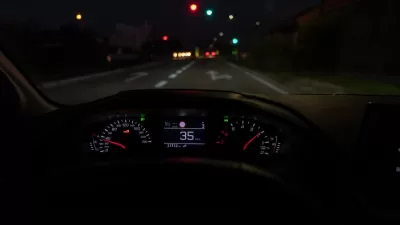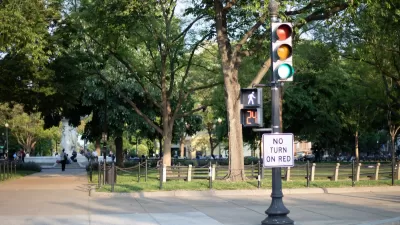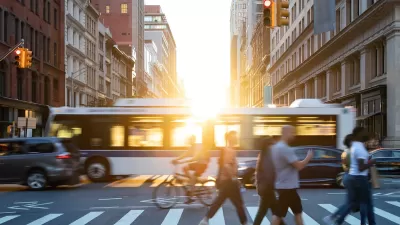Born out of the oil crisis of the 1970s, the practice of turning right on red lights is a uniquely American—and uniquely dangerous—custom.

Most American drivers don’t think twice about making a right turn on a red light (RTOR). For decades, it’s been the status quo in many cities. But as Abigail Weinberg explains in an illuminating Slate article, the habit is relatively new and, to many experts, obsolete and dangerous. According to Weinberg, “The data on right-turn-on-red crashes might be scarce, but the existing studies suggest that these types of collisions—while rare—frequently involve a pedestrian or cyclist.”
The practice was born out of the 1970s oil crisis, when the government sought to reduce emissions by minimizing idling at red lights. “A provision of the 1975 Energy Policy and Conservation Act said that, in order for states to receive federal assistance for mandated conservation programs, they had to enact ‘a traffic law or regulation which, to the maximum extent practicable consistent with safety, permits the operator of a motor vehicle to turn such vehicle right at a red stop light after stopping.’”
However, the policy has never been proven to significantly reduce emissions or idling time. “Take into account the growing number of hybrid and electric cars, and RTOR makes even less sense.” Meanwhile, electric vehicles have the potential to increase RTOR crashes due to their quicker acceleration.
Quoting transportation engineer Bill Schultheiss, Weinberg concludes that making right turns on red illegal, while a “minor enough inconvenience” for drivers, could be “a baby step in creating an urban environment that is more supportive of walking, bicycling, and transit.”
Today, more cities are moving to ban RTOR. New York City has a ban, and Washington, D.C. could soon follow, if legislation passed by the district’s council is approved by the mayor and Congress. Ann Arbor, which delayed its vote on the issue earlier this year, voted to ban RTOR at 50 intersections in its downtown.
FULL STORY: The Surprising History—and Deadly Consequences—of Right Turn on Red

Maui's Vacation Rental Debate Turns Ugly
Verbal attacks, misinformation campaigns and fistfights plague a high-stakes debate to convert thousands of vacation rentals into long-term housing.

Planetizen Federal Action Tracker
A weekly monitor of how Trump’s orders and actions are impacting planners and planning in America.

San Francisco Suspends Traffic Calming Amidst Record Deaths
Citing “a challenging fiscal landscape,” the city will cease the program on the heels of 42 traffic deaths, including 24 pedestrians.

Adaptive Reuse Will Create Housing in a Suburban Texas Strip Mall
A developer is reimagining a strip mall property as a mixed-use complex with housing and retail.

Study: Anti-Homelessness Laws Don’t Work
Research shows that punitive measures that criminalized unhoused people don’t help reduce homelessness.

In U.S., Urban Gondolas Face Uphill Battle
Cities in Latin America and Europe have embraced aerial transitways — AKA gondolas — as sustainable, convenient urban transport, especially in tricky geographies. American cities have yet to catch up.
Urban Design for Planners 1: Software Tools
This six-course series explores essential urban design concepts using open source software and equips planners with the tools they need to participate fully in the urban design process.
Planning for Universal Design
Learn the tools for implementing Universal Design in planning regulations.
Heyer Gruel & Associates PA
JM Goldson LLC
Custer County Colorado
City of Camden Redevelopment Agency
City of Astoria
Transportation Research & Education Center (TREC) at Portland State University
Jefferson Parish Government
Camden Redevelopment Agency
City of Claremont





























